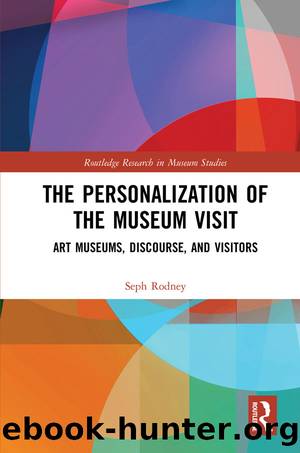The Personalization of the Museum Visit by Seph Rodney

Author:Seph Rodney [Rodney, Seph]
Language: eng
Format: epub
Tags: Social Science, Archaeology
ISBN: 9781351695862
Google: lX-YDwAAQBAJ
Publisher: Routledge
Published: 2019-05-13T03:47:07+00:00
An experience economy
To explain what all this means for the museum, a useful framework is the idea of an economy. The conceptual models that organize and the rules that make mutually comprehensible the action of markets, producers, and consumers through processes of production, exchange, and distribution are economies. Boswijk, Thijssen, and Peelen (2007) relate that contemporary businesses that participate in what they term an âexperience economyâ have increasingly abandoned a now antiquated model of production and consumption.3 When marketing first began to cohere as a set of defined strategies, it âattempted to bring together the demand for and the supply of products by organizing their physical distributionâ (p. 50). But this approach was abandoned once marketing, working primarily through advertising, turned toward the creation of demand, as Gabriel and Lang pointed out in the above. Now, according to Boswijk et al. (2007), in the current economic paradigm, businesses must look toward the various markets or target groups that they desire to serve and then develop products and services for these desired groups through collaboration with them. As they write, âit will be about constructing a contextâtogether with the customerâin which the latter, lives, experiences, and gives meaning to his lifeâ (p. 52).
This is to say, the approach of classic marketing was the marketer taking the customer by the hand to a storehouse of goods and pointing out the available commodities, one of which it was hoped would meet the customerâs desire. In the new paradigm of an experience economy the marketer requests the customer take the marketer by the hand, share vital information about personality and learning styles, and describe the class or kind of experience desired, and then the two agents work together in collaboratively fashioning experience that meets these criteria. At the same time, what I have just described lies at the root of ethnography and the discipline of visitor studies. This to say, these methods of information exchange and cooperation are not only specific to marketing. Rather, marketing is the way these tools have primarily entered museum professional practice with regard to audience development.
We may speak loosely of an economy of visitors purchasing products and services at museums, given that we have a producer in the museum, and a potential purchaser in the visitor, and the distribution of what we might look on as goods or services, in terms of the offered events, exhibitions, and experiences. Essentially what is being sold and purchased, if not with monetary currency but with the currency of the visitorâs time and attention, is a kind of experience, at the center of which is an affective response.4 Consumption is a complex process, and made more so when considered in the museum context precisely because of the intangible nature of the experience that is putatively being purchased. More, consumption as it is defined in the above does not seem to easily map onto the self-determining visitor figure generated by the interpretive museum, since, by its very formulation within the logic of marketing, a consumer is not regarded as an equal.
Download
This site does not store any files on its server. We only index and link to content provided by other sites. Please contact the content providers to delete copyright contents if any and email us, we'll remove relevant links or contents immediately.
Chaco's Northern Prodigies : Salmon, Aztec, and the Ascendancy of the Middle San Juan Region after AD 1100 by Paul F. Reed(376)
Digital International Relations by Unknown(371)
Law Enforcement Interpersonal Communication and Conflict Management by Brian Douglas Fitch(365)
Skilled interpersonal communication: Research, theory and practice, Fifth edition by Owen Hargie(355)
The Enduring Color Line in U.S. Athletics by Krystal Beamon Chris M. Messer(351)
Critical Perspectives on Human Security : Rethinking Emancipation and Power in International Relations by David Chandler; Nik Hynek(340)
EPSO CAST Political affairs EU policies: How to succeed in the selection procedure by Franco Reverte José María(325)
Evidence-Based Policy Making in Labor Economics by Hamermesh Daniel S.;Nottmeyer Olga K.;Nottmeyer Olga;King Sarah;King Sarah;King Sarah;(317)
Writing Public Policy - A Practical Guide to Communicating in the Policy Making Process by Catherine F. Smith(297)
Criminological Theory in Context by John Martyn Chamberlain(292)
Rothschild and Early Jewish Colonization in Palestine (Geographical Perspectives on the Human Past) by Ran Aaronsohn(290)
Positive Psychology and Spirituality in Counselling and Psychotherapy (Conflict, Ethics, and Spirituality, 12) by unknow(285)
Tibeton Yoga Its Secret Doc by Evans-Wentz(283)
Threshold Concepts in Women's and Gender Studies by Christie Launius Holly Hassel(278)
Social Problems, Social Issues, Social Science by James Wright(274)
Cognitive Development in Infancy and Childhood (Elements in Child Development) by Mary Gauvain(273)
Play in child development and psychotherapy: toward empirically supported practice by Sandra W. Russ(272)
Latin American Politics and Society by Gerardo L. Munck & Juan Pablo Luna(251)
What Makes a Social Crisis?: The Societalization of Social Problems by Jeffrey C. Alexander(232)
